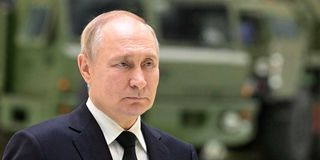Putin’s arrest warrant good for justice but bad for peace

Russian President Vladimir Putin.
Russian leader Vladimir Putin’s recent visits to Mariupol and Crimea in Russian-occupied Ukraine illustrate the complexity of the war in Ukraine. Putin is playing to a domestic and international constituency in defying the recently issued arrest warrant and visiting Mariupol and Crimea.
The Russian leader is making the case for the Russian invasion of Ukraine to protect Russian minorities in former soviet republics and confronting the existentialist threat of the North American Treaty Organisation (NATO) to Russia.
These visits raise his popularity in Russia, where recent polls indicate most Russians support his actions in Ukraine. To the international community, and specifically to the US and its NATO allies, Putin’s defiance plays to the Russian fear that institutions of international justice are being weaponised for regime change and to weaken Russia.
While the International Criminal Court (ICC) arrest warrant seeks to hold Putin accountable for the Russian invasion of Ukraine, it risks crippling diplomatic initiatives to bring a resolution to the war in Ukraine.
Arrest warrant
The arrest warrant will lead to the marginalisation of pro-democracy activists in Russia, whom Putin can frame as puppets of the US and NATO interests against the Russian republic. It isolates Russia and polarises international opinion on the issuance of an arrest warrant for a sitting head of state.
The warrant further reinforces perceptions, in rising powers such as Russia and China, that international institutions for justice like the ICC are being weaponised to undermine authoritarian regimes around the world. Putin now sees no need to de-escalate the war in Ukraine.
On the contrary, the arrest warrant only strengthens the hand of hardliners in Moscow to escalate the war. For Russia, war will be seen as the only means to achieve peace in Ukraine.
Given that Russia is not a signatory to the Rome Statute that established the ICC, this arrest warrant will need to be effected by state parties that signed onto the Rome Statute. This leaves many nations in the developing world in a horrible dilemma.
Facing sanctions
Countries like Kenya, Mexico, India, Brazil, Turkey or Indonesia will be caught between facing the wrath of the ICC for not arresting Putin during visits to these nations and facing sanctions from the US and other NATO allies for ignoring their obligations under the Rome Statute.
Lastly, Russia will look to use its influence internationally to advance soft balancing against the US. Soft balancing is the use of non-military means to indirectly frustrate and cripple the initiatives of rivals on the international stage.
For instance, at the United Nations, where Russia holds veto power on the Security Council, this arrest warrant will only raise tension between the US and Russia. Moscow will be looking to check American international hegemony by moving closer to nations that oppose the US like Iran and China.
Prof Monda teaches at the City University of New York (York College), New York, USA. [email protected] @dmonda1, davidmonda.com





